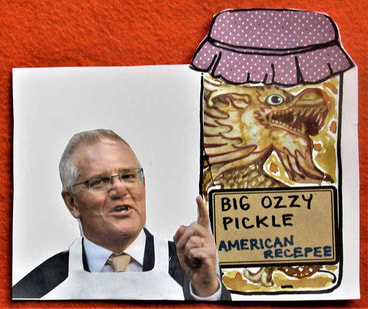 Cartoon: Natasha Williams-Novak
Cartoon: Natasha Williams-Novak IF THERE is one thing we have learned from the pandemic, it’s that mankind and planet earth can accomplish wonders through co-operation. At the same time we’ve witnessed great harm when we’re parochial and greedy.
Two issues, which have arisen in the same week and were generated from within our federal government, seem to steer us away from reason and co-operation: one is the decision to abandon a $90 million submarine contract with the French and commit to an alliance with the US and UK to build nine nuclear-powered subs at a cost of … no one knows.
1. Is it wise, given that the US seems politically broken … and which may yet turn back to madness? Or the UK, which seems impaled on the sharp spikes of nostalgia for its time of greatness?
2. Have you read the accounts of this announcement in the US media? Most commentators seem over the moon at having acquired three new naval bases in the Indo-Pacific region: Fremantle, Darwin and possibly somewhere near Brisbane.
3. Do we need any subs at all? What else might we do with $90 billion?
Around the same time as the joyous announcement of allying ourselves with other old white men who love going to war, the Federal Government announced that it was too hard to protect endangered species and ecosystems so they were no longer going to waste tax dollars on trying. One might have thought that there were salient lessons to be learned from scientists, including virologists, about dangers of all sorts from ecosystem destruction.
But allow me to circle the wagons: recently I tried to summarise the Road Map outlined by the Just Transitions group of South Gippsland. I think it is a good document, one designed to stimulate reflection, and reflection is an important ingredient in a good life.
However, in my view, there was a missing item. The Road Map doesn’t talk about the obvious fact that climate change is a global issue. We cannot protect ourselves and our corner of the world even by reaching our zero-carbon footprint and restoring our wonderful ecosystems.
Climate change is a global problem, so is it possible that we might better address this monumental issue by forming peaceful alliances with as many communities across Australia, with our neighbouring nations and with as many other nations as possible?
Might it even be possible to divert the $90 billion to our poorer neighbours to help them cope with climate change, as well as to strengthen our health and educational efforts and restore ecosystems?
But who will lead us? Perhaps, instead of asking that question, we must put up our own hands and begin to lead the way.
How can we become leaders? Estimates are that, globally a million groups are working on advocacy for climate action and justice but rarely in a collaborative manner. Might we begin by reaching out to our Pacific neighbours and those nations to our north, and work with them collaboratively? Might we share technology and wisdom? Might we send news of these efforts to our more distant neighbours in Africa and South America, and welcome their requests to become involved? Is it not one of the great themes within Australia that ‘from little things, big things grow’?
It’s true, I have asked a lot of questions that might not be immediately answerable, but we’re already offering answers at the shire level in South Gippsland and Bass Coast. Perhaps we might align ourselves with neighbouring shires, even shires on the other side of Melbourne or, heaven forbid, in Queensland and other states. Perhaps in doing so, might we undermine those fools and fanatics who ask for our votes.
I mentioned in the first paragraph our stoic hope that we might learn from our hard lessons. We live in an age when all we seem to talk about is prosperity. The stoics talked about both prosperity and the preparedness for adversity. Dealing with adversity is a great strength, one we will need, so let us embrace the adversity and find joy in overcoming it.